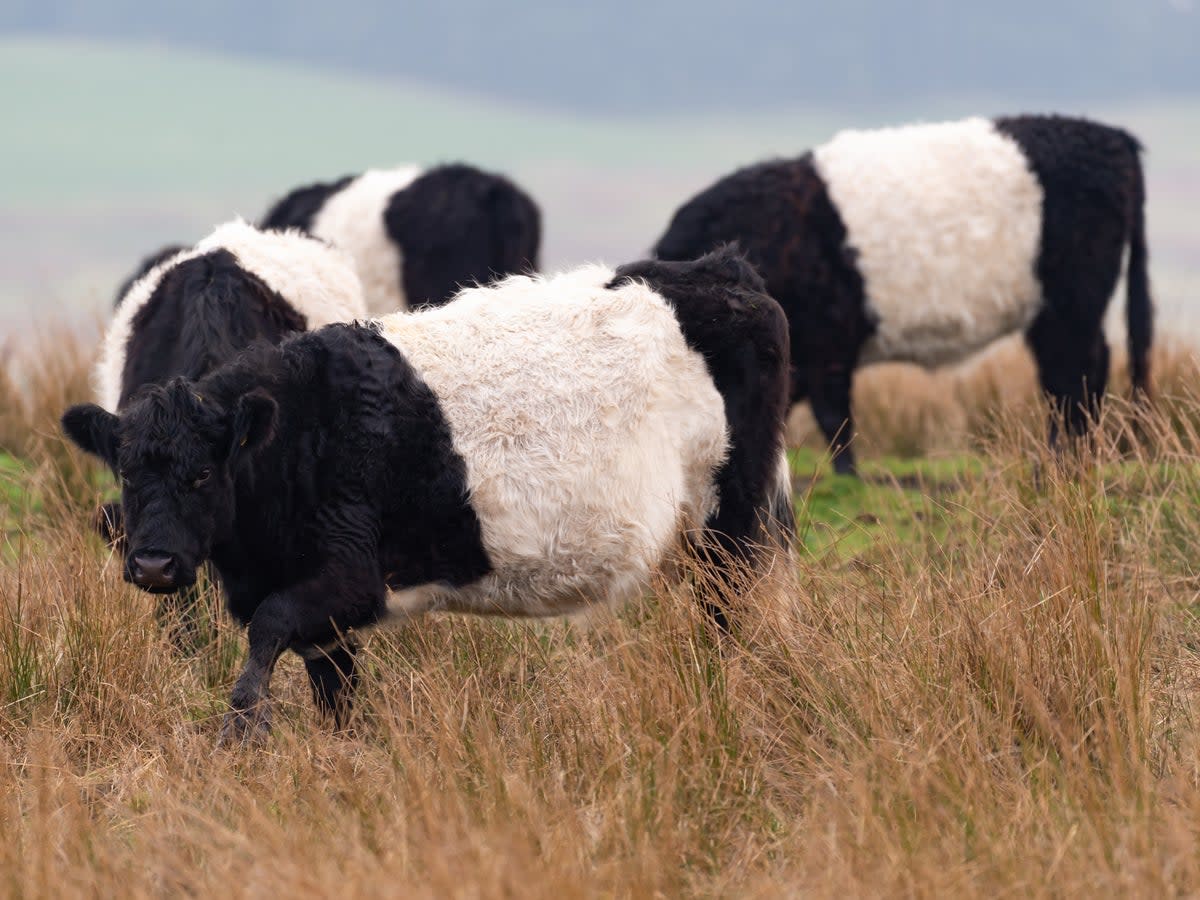Government accused of ‘sitting on the fence’ on climate impact of eating meat as Eustice questions science

- Oops!Something went wrong.Please try again later.
The government has been accused of being "on the fence" when it comes to recognising the detrimental impacts meat consumption is having on the environment.
During a meeting with the Lords’ Environment and Climate Change Committee which explored the government’s record on mobilising behaviour change in the population to help tackle the climate crisis, environment secretary George Eustice defended rearing and eating livestock, and questioned the science which shows the scale of the detrimental impact livestock farming is having on the planet.
Asked by Baroness Rosie Boycott about the lack of messaging from the government on reducing meat consumption, which she said was among the "single most important things we can do as individuals", Mr Eustice said the government would "not be launching an advertising campaign" on the issue.
Baroness Boycott said despite the importance of cutting meat consumption, there remains "such an ambivalence from government about the way they handle meat".
She asked: "Is the government going to stay on the fence about this?"
Describing the issue as "complex", and suggesting the science around calls for reduction in meat consumption "is disputed", Mr Eustice said: "It’s to do with the proper appreciation of the more holistic role of livestock in the farmed landscape and the environment."
He also told the committee: "It’s quite depressing when people say "livestock are bad, therefore eat less meat’."
"We are ultimately omnivores – in our natural state we will have meat and animal products and proteins as part of our diet… That’s the natural state of us as a species. But of course, some people will choose to be herbivores and that’s a choice that they can take."
Going on to address concerns about methane emissions from livestock, which Mr Eustice pointed out is a potent but short-lived greenhouse gas, Baroness Boycott then cut him off saying key concerns were over land usage and the large amounts of land used to feed animals rather than humans.
Mr Eustice responded: "That’s right, but also soya milk as a dairy alternative uses soybeans. People who think they’re doing the right thing for the planet may be aiding and abetting deforestation. These things are complex."
Over the past 50 years global meat production has more than tripled, with mounting environmental tolls, including raising greenhouse gas emissions, particularly of methane, requiring more water and ever greater agricultural land, both for grazing and for growing feed, both of which have had major impacts on biodiversity.
Surging appetites for meat have resulted in sprawling farmed landscapes which have a major impact on environments such as rainforests. Many farmers in the UK and EU who graze their cattle on grass still require vast amounts of supplementary, often soy-based feeds which can come from illegally cleared rainforest land.
According to Oxford University’s website Our World In Data, beef and lamb production have disproportionately large impacts on the environment. The creation of just one kilo of beef typically emits the greenhouse gases to the tune of 99.5kg of carbon dioxide.
Lamb produces 39.7kg of carbon dioxide equivalent per kilo, eggs 4.7kg, rice 4.5kg, and tofu from soybeans, 3.16kg.
Ultimately, livestock farming uses 80 per cent of all agricultural land while producing just 20 per cent of all calories.
This week, Rob Percival, head of food policy at the soil association, noted that "a 15 per cent reduction in pig and chicken production at a European level would make up for all the shortfall in grain from Ukraine/Russia."
The Lords’ Committee also discussed intensive beef-rearing techniques compared to beef fed entirely on pasture.
The Duke of Wellington, who declared an interest as an agricultural land owner, urged the government to "make a greater distinction between different types of meat", appearing to suggest that pasture-reared meat is more environmentally friendly.
He said: "That message is not getting through to the public. The public is being told ‘meat eating is bad, reduce your meat consumption’, that’s the simple message that’s being given, and I really do think it would be sensible and environmentally advantageous to try and educate the public in the different types of meat."
However, low intensity pasture-reared cattle require 20 times as much space as intensively farmed cattle, tend to live longer lives, in which they release more methane, and only provide a fraction of the meat which is consumed – usually by wealthy people.
According to a 2012 study, if the global population switched to a diet rich with pasture-reared cattle and sheep, we would need another entire planet to meet demand.
Mr Eustice told The Duke of Wellington: "We’re very explicit in saying that from an environmental perspective we’re not telling people that they shouldn’t eat meat."
He added: "We are seeking to reduce the environmental impact of meat… and emissions from the livestock sector."
He told the committee: "It’s not as straightforward as saying livestock is bad for the environment. Livestock done the right way is actually a positive for biodiversity."
He also suggested new feed additives could reduce methane emissions from ruminants.
"If we could do something about the diet of the ruminants rather than lecturing people about eating less meat … it’s probably a better way to tackle the challenge."

